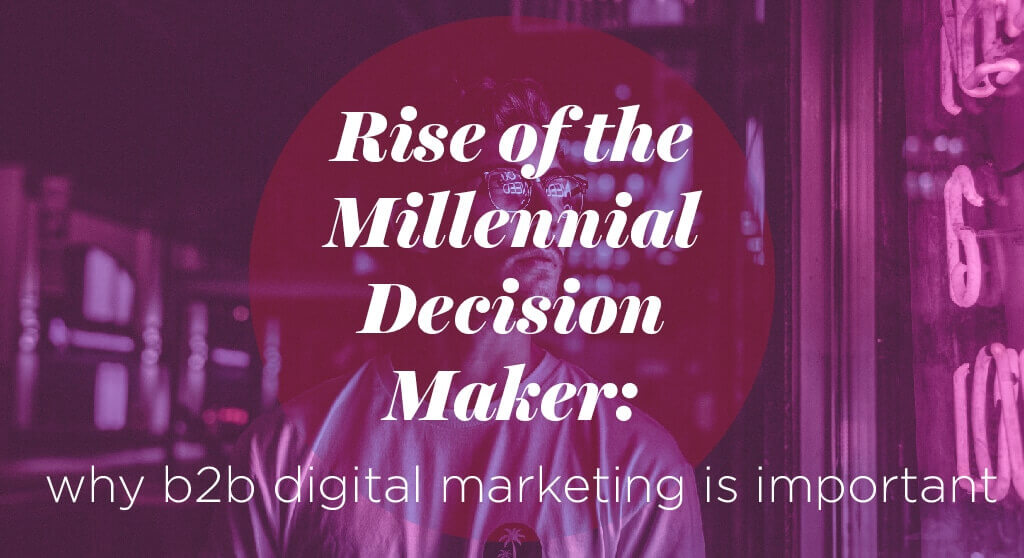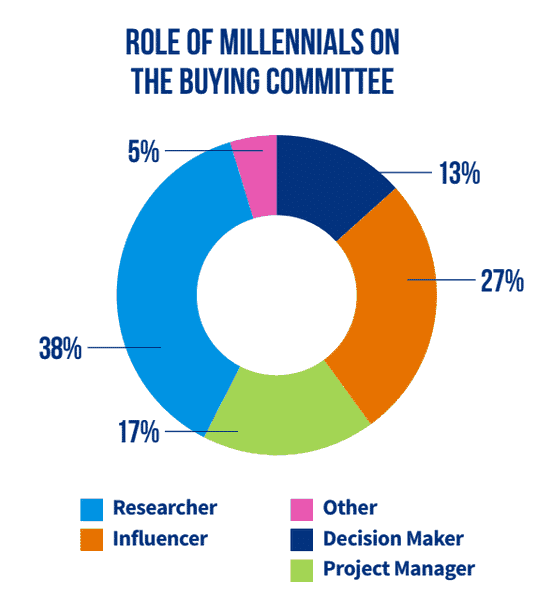
Millennials and B2B Digital Marketing
There ‘s a common misconception that the generation born between 1980 and 2000 all live in their parents basement, live on avocados and toast, and generally are apathetic to work. The reality is that nearly 1/3rd of all in this generation have already started a business, and nearly half want to. That outperforms Baby Boomers by more than 10%.
Additionally, this generation represents about 1/3rd of the population of the US. So as Boomers retire, the balance of decision making will begin tipping in the direction of millennials. As a B2B marketer understanding this shift, and what it will mean in terms how marketing will change is vital. Luckily, as a company comprised entirely of millennials, it’s easier for us to understand how this looks. So here are a few tips that can help you understand why B2B digital marketing is important to a growing number of millennial decision makers.
They Are the Researchers
In a study by SnapApp and Heinz Marketing, the role in a buying committee that millennials took was that of the researcher. Whether that’s because they were perceived as the most tech savvy, or because they naturally research everything they buy, it’s often the role they have.
So what does this mean for a business? If you want to connect with this audience, you’d best have data and researchable items for these buyers to find. This can include blogs, downloadable sheets, and of course case studies. The more research they can uncover about your business, the more likely they are to buy with you.
They Trust Peer Reviews, Not Salespeople
In B2C consumption companies like Amazon have made a living on using the reviews of other buyers to help in the decision making process. The same is true in the B2B sphere. Millennial buyers tend to use online reviews, and the personal reviews they get from people they know to help them make large decisions
How do you rectify this in your B2B business? Google reviews, social media reviews, and other online review sites can help you create a better level of confidence as buyers research your company. Additionally, on your website it’s important to have trust icons, and testimonials from past clients, to give that extra peace of mind. Using their name and the business they are associated with allows them to do research on your clients, and determine the accuracy of your website.
They Are Data Driven
Part of being the main researcher is the notion that data will be your main focus in your decision making process. Points like peer reviews, customer loyalty, your process, and your outcomes are all data points that these folks will use to make the case that you’re the right vendor.
The goal for you as a business is to make every data point as accessible as possible. Sure, gating this content for your own marketing purposes is perfectly fine. But hiding it until you get a sales person in front of them isn’t going to help your case. Sales can’t be the gate keeper of your information, marketing needs to get out in front of that and provide millennial buyers with as many data points in your favor as they can.
Conclusion
I’ve sat in meetings where the person across the table says to me, “ we don’t want to share our pricing with our competitors.” To which I respond, “do you have theirs?” They almost always respond in the affirmative. My response is always the same, “then they have yours, why hide it from potential buyers?”
Price is a data point, and cannot be overlooked when you’re filling in a potential buyer on whether or not they should work with you.
Millennials are often cast as the generation that doesn’t think, or uses emotions to guide their decisions. The data on that doesn’t support that theory, and should support how you market to them. Has this generation loved Apple advertising? Sure!
But if I ask around to all my fellow Mac users on why they buy Apple products it has nothing to do with an emotional connection. It’s because the products work, they interconnect and create an ecosystem, they last a long time, and their support is great. That doesn’t sound like a non-thinking decision.
When it comes to business decision making, the same holds true. Data is the main reason they do what they do, and so you have to reflect that. Because like your pricing, your competition is doing it, and if they’re not, now’s the time to get that leg up.

